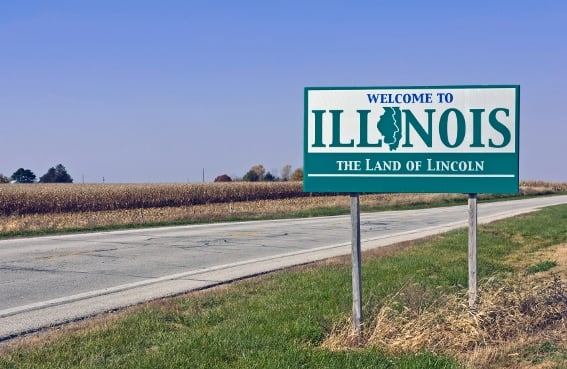The Land of Lincoln is holding onto its dead presidents as long as possible, stiffing vendors as small as local pizzerias and as large as IBM
In Illinois, you're never too big or too small to get stiffed by the state, which is $4 billion behind in its bills.
International Business Machines Inc. is owed $1.1 million. Office Depot Inc. (ODP) is waiting for a $660,955 check. And the 17th Street Bar & Grill in Sparta is due $340.52. They are among at least 8,000 vendors including businesses, charities and government agencies waiting months for the state to pay up. At least 114 companies are due more than $1 million, according to documents from Illinois Comptroller Judy Baar Topinka.
While states periodically fall behind in paying Medicaid providers or, in the case of California, rely on bank loans and IOUs, the Illinois backlog has been growing for three years. It's forcing some vendors to fire workers, cut services and, if they can, obtain loans and lines of credit to keep their businesses going while the state takes months to pay.
“An Illinois phenomenon,” said Ron Ford, CEO of Chicago- based Help at Home Inc., which is owed $43.4 million and hasn't heard from the state since December.
Creditors include health and education agencies, schools, charities, funeral homes, plumbing-and-heating contractors and purveyors of food, coal, clothing, electronics and pizza.
Deadbeat State
“Banks have refused us a line of credit because of the state,” said David Baker, who runs the nonprofit Open Door Rehabilitation Center in Sandwich, Illinois, and is owed $880,000. “We've had a long-time relationship with bankers, but now they wonder ‘What if the state never pays you?'”
State lawmakers last month balked at Governor Pat Quinn's bonding plan to clear up the debt. Resolving it is a top priority, Kelly Kraft, a spokeswoman for the 61-year-old Democrat, said in a telephone interview yesterday.
The backlog, which outstrips Delaware's $3.5 billion budget, resembles a revolving fund. As the state pays months-old bills, some dating to last year, new ones are filed.
“We're going to try and work our way out of it,” Topinka said in a June 2 interview in her Chicago office. “Don't expect this to happen, as I said, tomorrow, because it won't.”
In January, lawmakers approved increases of 67 percent in the state income tax and a 46 percent in the corporate income tax. Those, however, weren't sufficient to cover the backlog, and the bills will be passed onto the fiscal year that begins July 1.
Unpaid-For Pizza
They include $5.5 million owed Wright Express Financial Services Corp., for gasoline credit-card charges; $1.4 million for Xerox Corp. (XRX); $11,300 to a downstate restaurant, La Roma Pizza in Canton; and fees for burying the indigent dead to almost 100 funeral homes.
“These are small businesses owed $1,100 to $1,500 and waiting six to nine months to get paid,” said Duane Marsh, executive director of the Illinois Funeral Directors Association. “It isn't chump change.”
Delayed payments are also affecting hospitals, universities and public-school districts.
“It's utterly ridiculous,” said Joshua Collins, director of government relations for the Greater Springfield Chamber of Commerce. “There is no plan to pay them off.”
As the bills mounted, the cost of insuring $10 million worth of Illinois bonds against default for 10 years has risen 28 percent since May 20, almost triple the increase in the Markit MCDX Index of 50 municipal issuers. The index prices were provided by CMA, which is owned by CME Group Inc.
Years Behind
Illinois, which borrowed to make its two most recent annual pension payments, is tied with California as the lowest-rated state in the estimation of Moody's Investors Service, at A1.
Karen Krop, an analyst with Fitch Ratings in New York, said the accumulated liabilities contribute to the firm's A rating, sixth from the top.
The consequences of years of ignoring bills fall on organizations such as the South Suburban Council on Alcoholism and Substance Abuse, in the Chicago suburb of East Hazel Crest. The nonprofit has an annual budget of $5 million, and 75 percent of its revenue comes from state funding, said CEO Allen Sandusky.
Sandusky, whose company was owed as much as $1.4 million, has cut his staff to 105 from 155 and obtained a $1 million line of credit at 6 percent interest.
“The state contracts with us to provide services, and we believe there is an ethical and moral obligation to pay providers in a timely way,” Sandusky said. “Somehow the human service system tends to be on the lower end of the priority list.”
Nowhere to Sleep
Eight of the state's 10 largest non-government creditors are health or social-service providers whose outstanding bills total $176.2 million, according to the comptroller's office.
“We're working with less ability to serve a population that is facing the highest need in our nation's history,” said Neli Vazquez-Rowland, president of A Safe Haven, a Chicago-based organization that offers aid to the homeless and is owed $1.7 million.
“The last thing we want to do is turn them away,” she said.
Help at Home cares for about 14,000 Illinois senior citizens. Ford said his company is fortunate because it is large -- it operates in 10 states -- and has access to credit. He said he is compensating by billing other governments more quickly.
“Other states are carrying the Illinois burden,” Ford said.
Vendors such as Baker, whose Open Door Rehabilitation Center treats and provides shelter for the developmentally disabled, aren't expecting quick relief.
“Our only business is with the state,” Baker said. “You cross your fingers and live another week, but you can't continue to operate with this kind of payment delay.”
--Bloomberg News--







